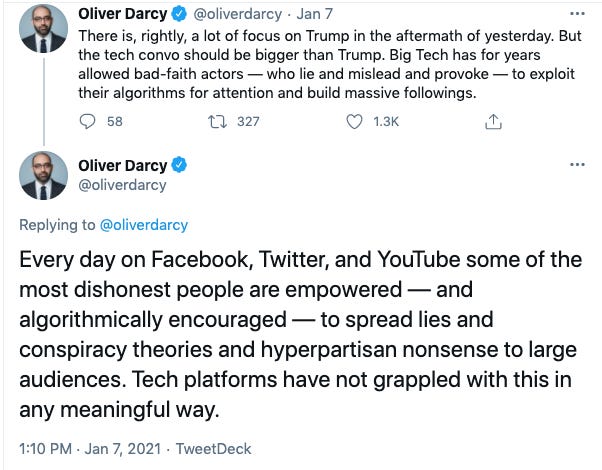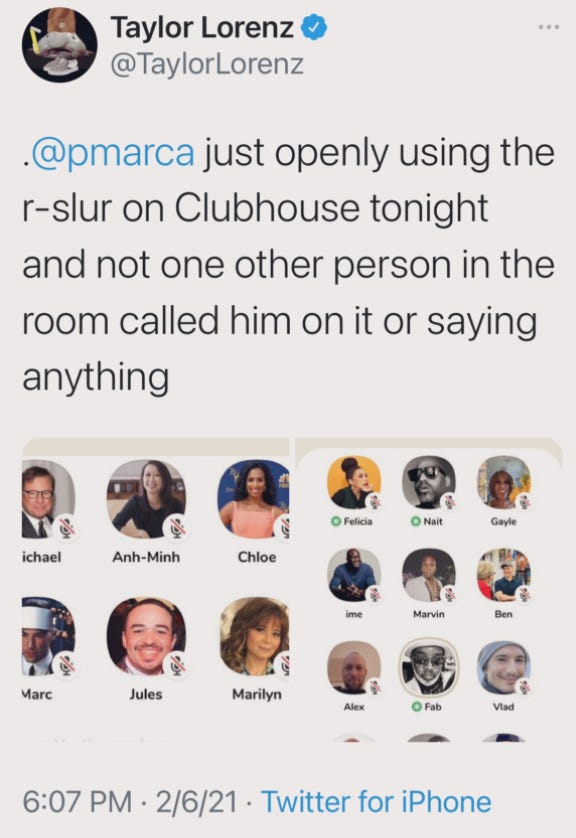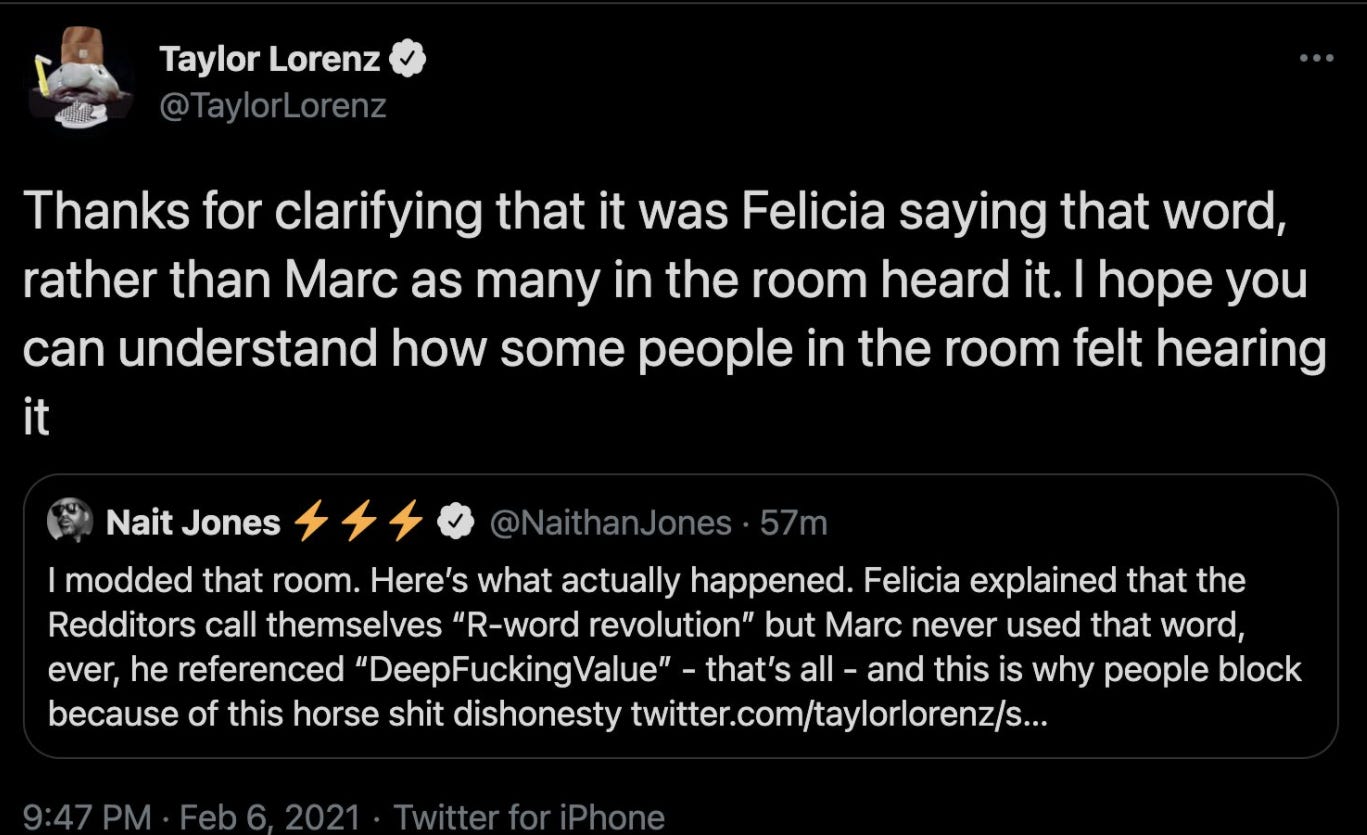
by Glenn Greenwald
A new and rapidly growing journalistic “beat” has arisen over the last several years that can best be described as an unholy mix of junior high hall-monitor tattling and Stasi-like citizen surveillance. It is half adolescent and half malevolent. Its primary objectives are control, censorship, and the destruction of reputations for fun and power. Though its epicenter is the largest corporate media outlets, it is the very antithesis of journalism.
I’ve written before about one particularly toxic strain of this authoritarian “reporting.” Teams of journalists at three of the most influential corporate media outlets — CNN’s “media reporters” (Brian Stelter and Oliver Darcy), NBC’s “disinformation space unit” (Ben Collins and Brandy Zadrozny), and the tech reporters of The New York Times (Mike Isaac, Kevin Roose, Sheera Frenkel) — devote the bulk of their “journalism” to searching for online spaces where they believe speech and conduct rules are being violated, flagging them, and then pleading that punitive action be taken (banning, censorship, content regulation, after-school detention). These hall-monitor reporters are a major factor explaining why tech monopolies, which (for reasons of self-interest and ideology) never wanted the responsibility to censor, now do so with abandon and seemingly arbitrary blunt force: they are shamed by the world’s loudest media companies when they do not.
Oliver Darcy has built his CNN career by sitting around with Brian Stelter petulantly pointing to people breaking the rules on social media and demanding tech executives make the rule-breakers disappear. The little crew of tattletale millennials assembled by NBC — who refer to their twerpy work with the self-glorifying title of “working in the disinformation space”: as intrepid and hazardous as exposing corruption by repressive regimes or reporting from war zones — spend their dreary days scrolling through 4Chan boards to expose the offensive memes and bad words used by transgressive adolescents; they then pat themselves on the back for confronting dangerous power centers, even when it is nothing more trivial and bullying than doxxing the identities of powerless, obscure citizens.
But the worst of this triumvirate is the NYT’s tech reporters, due to influence and reach if no other reason. When Silicon Valley monopolies, publicly pressured by Rep. Alexandria Ocasio-Cortez (D-NY) and other lawmakers, united to remove Parler from the internet, the Times’ tech team quickly donned their hall-monitor goggles and Stasi notebooks to warn that the Bad People had migrated to Signal and Telegram. This week they asked: “Are Private Messaging Apps the Next Misinformation Hot Spot?” One reporter “confess[ed] that I am worried about Telegram. Other than private messaging, people love to use Telegram for group chats — up to 200,000 people can meet inside a Telegram chat room. That seems problematic.”
These examples of journalism being abused to demand censorship of spaces they cannot control are too numerous to comprehensively chronicle. And they are not confined to those three outlets. That far more robust censorship is urgently needed is now a virtual consensus in mainstream corporate journalism: it’s an animating cause for them.
“Those of us in journalism have to come to terms with the fact that free speech, a principle that we hold sacred, is being weaponized against the principles of journalism,” complained Ultimate Establishment Journalism Maven Steve Coll, the Dean of Columbia University’s Graduate School of Journalism and a Staff Writer at The New Yorker. A New Yorker and Vox contributor who runs a major journalistic listserv appropriately called “Study Hall,” Kyle Chayka, has already begun shaming Substack for hosting writers he regards as unacceptable (Jesse Singal, Andrew Sullivan, Bari Weiss). A recent Guardian article warned that podcasts was one remaining area still insufficiently policed. ProPublica on Sunday did the same about Apple, and last month one of its reporters appeared on MSNBC to demand that Apple censor its podcast content as aggressively as Google’s YouTube now censors its video content.
Thus do we have the unimaginably warped dynamic in which U.S. journalists are not the defenders of free speech values but the primary crusaders to destroy them. They do it in part for power: to ensure nobody but they can control the flow of information. They do it partly for ideology and out of hubris: the belief that their worldview is so indisputably right that all dissent is inherently dangerous “disinformation.” And they do it from petty vindictiveness: they clearly get aroused — find otherwise-elusive purpose — by destroying people’s reputations and lives, no matter how powerless. Whatever the motive, corporate media employees whose company title is “journalist” are the primary activists against a free and open internet and the core values of free thought.
The profound pathologies driving all of this were on full display on Saturday night as the result of a reckless and self-humiliating smear campaign by one of The New York Times’ star tech reporters, Taylor Lorenz. She falsely and very publicly accused Silicon Valley entrepreneur and investor Marc Andreessen of having used the “slur” word “retarded” during a discussion about the Reddit/GameStop uprising.
Lorenz lied. Andreessen never used that word. And rather than apologize and retract it, she justified her mistake by claiming it was a “male voice” that sounded like his, then locked her Twitter account as though she — rather than the person she falsely maligned — was the victim.
But the details of what happened are revealing. The discussion which Lorenz falsely described took place on a relatively new audio app called “Clubhouse,” an invitation-only platform intended to allow for private, free-ranging group conversations. It has become popular among Silicon Valley executives and various media personalities (I was invited onto the app a few months ago but never attended or participated in any discussions). But as CNBC noted this week, “as the app has grown, people of more diverse backgrounds have begun to join,” and it “has carved out a niche among Black users, who have innovated new ways for using it.” Its free-speech ethos has also made it increasingly popular in China as a means of avoiding repressive online constraints.
These private chats have often been infiltrated by journalists, sometimes by invitation and other times by deceit. These journalists attempt to monitor the discussions and then publish summaries. Often, the “reporting” consists of out-of-context statements designed to make the participants look bigoted, insensitive, or otherwise guilty of bad behavior. In other words, journalists, desperate for content, have flagged Clubhouse as a new frontier for their slimy work as voluntary hall monitors and speech police.
Fulfilling her ignoble duties there, Lorenz announced on Twitter that Andreessen had said a bad word. During the discussion of the “Reddit Revolution,” she claimed, he used the word “retarded.” She then upped her tattling game by not only including this allegation but also the names and photos of those who were in the room at the time — thus exposing those who were guilty of the crime of failing to object to Andreessen’s Bad Word:
Numerous Clubhouse participants, including Kmele Foster, immediately documented that Lorenz had lied. The moderator of the discussion, Nait Jones, said that “Marc never used that word.” What actually happened was that Felicia Horowitz, a different participant in the discussion, had “explained that the Redditors call themselves ‘retard revolution’” and that was the only mention of that word.
Rather than apologizing and retracting, Lorenz thanked Jones for “clarifying,” and then emphasized how hurtful it is to use that word. She deleted the original tweet without comment, and then — with the smear fully realized — locked her account.
Besides the fact that a New York Times reporter recklessly tried to destroy someone’s reputation, what is wrong with this episode? Everything.
The participants in Clubhouse have tried to block…
Continue Reading


